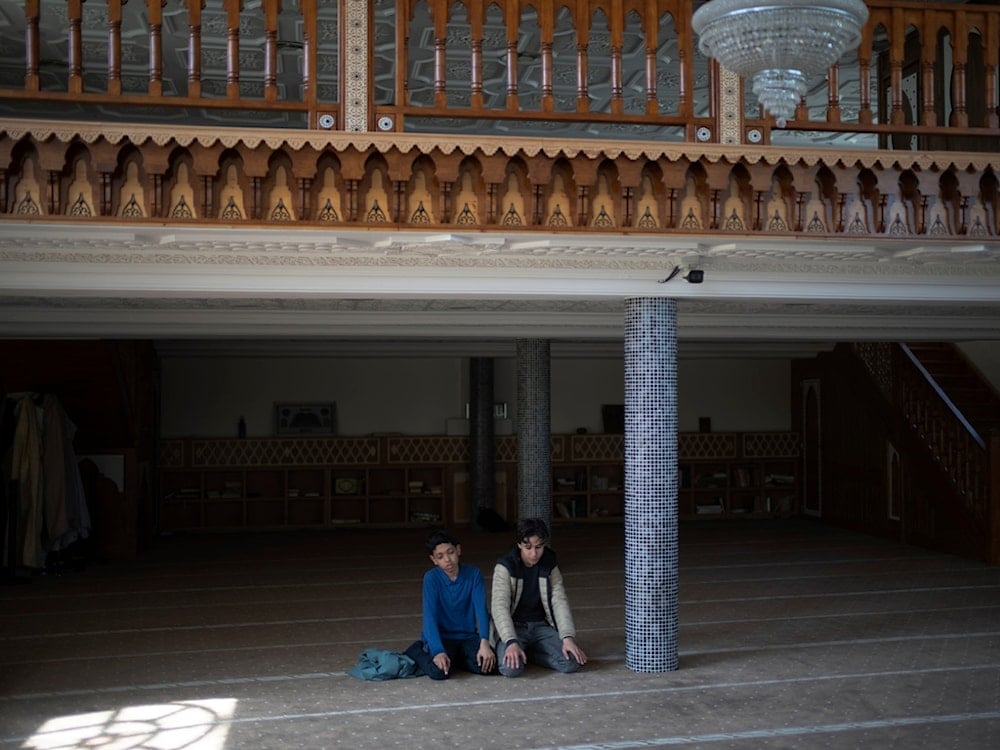Musulmans de France rejects govt. report linking it to Brotherhood
Founded in 1983, MF has undergone a decades-long transformation—from a student- and intellectual-led initiative into a major faith-based institution firmly grounded in the values of the French Republic.
-

Students pray during recess in the mosque at Ibn Khaldoun, a private Muslim school, in Marseille, southern France, Tuesday, April 16, 2024. (AP Photo/Daniel Cole)
As French authorities reviewed a new government report on political Islam and the Muslim Brotherhood at a Defense Council meeting on May 21, the federation Musulmans de France (MF) issued a firm and timely response rejecting what it described as unfair and damaging allegations.
The report, which does not name MF explicitly, nevertheless "designates indirectly – but without ambiguity – our federation as an organization affiliated or representative of the Muslim Brotherhood movement in France," according to the statement published by MF on May 20. "We cannot remain silent in the face of such an accusation, which has serious consequences for our image, our credibility, and our legitimacy in public debate," the federation declared.
MF noted that it had participated in good faith with the commission responsible for the report, describing the exchange as "a frank and constructive discussion" in 2024. It added that it had "provided all the information requested, without reservation, about (its) orientations, (its) actions, (its) governance, and (its) core principles." The organization expressed its surprise that such cooperative transparency was met with insinuations that ignore its years of reform, engagement, and public service.
Musulmans de France partage le communiqué officiel de l'IESH, publié ce 20 mai, en réponse aux accusations infondées d’« islamisme », de « frérisme » ou d’« entrisme ».
— Musulmans de France (MF) (@MF_Musulmans) May 20, 2025
L’IESH y réaffirme avec clarté sa mission : former des imams et cadres religieux dans un cadre rigoureux,… pic.twitter.com/jWgHtRvtYM
Founded in 1983, MF has undergone a decades-long transformation—from a student- and intellectual-led initiative into a major faith-based institution firmly grounded in the values of the French Republic. "Our federation has experienced a long journey of adaptation, maturation, and transformation," it noted. Today, it represents a model of integration, with younger generations of French-born Muslims in leadership roles, committed to shaping "an Islam of France" that is spiritually authentic and civically responsible.
"This evolution has resulted in a reinterpretation of religious texts in light of the French secular context, a process of theological contextualization, and a constant desire to adapt religious practice to the realities of citizenship," the statement explained.
Read more: 'Israel's' Gaza attacks fueling Islamophobia across Europe: Report
Contradictory expectations
MF raised an important critique of what it sees as the double standards facing Muslim communities. "The Muslim faith is now confronted with a double contradictory injunction: success is suspected of infiltration, doing nothing becomes separatism." The organization asked: "What must Muslim worship really do to be considered with fairness and respect, like the other recognized faiths in France?"
Far from retreating from the principles of French secularism, MF has actively supported efforts to build a transparent and representative framework for Muslim life in France. It signed the 2021 Charter of Principles for Islam in France at the Élysée, affirming its "attachment to the values of the Republic" and explicitly rejecting "any allegiance to a foreign power, in particular to the Brotherhood, and more broadly to political Islam."
Calling for a fair and rational national conversation, MF stated: "It is time to open a lucid, dispassionate debate to escape this trap of presumed intentions and to recognize for Muslims in France the right to organize their worship within the framework of the Republic, without permanent suspicion."
Misguided accusations
MF warned that continued confusion between religious belief and political ideology risks deepening divisions; "The amalgams, even unintentional, between Islam, political Islamism, and radicalism are not only dangerous but counterproductive for the Republic itself." The federation underlined that "behind these unfounded accusations lies a stigmatization of Islam and Muslims," fueled by a political and media environment that too often reduces complex realities to simplistic narratives.
"This constant indictment shapes minds, fuels fear, and unfortunately contributes to violent actions," MF stated, referring to the tragic case of Aboubakar Cissé. Yet the federation closed its statement by reaffirming its constructive approach: "We reaffirm our commitment to continue the dialogue with the State, in a spirit of republican loyalty and service to the general interest, for the benefit of all citizens."
Read more: France: Muslims fear for safety as far-right normalizes racist speech, violence
In a postscript, the report’s authors admitted that "while meetings with MF representatives were courteous, few follow-ups were made to document requests, which were not particularly intrusive." MF believes this further reveals a lack of engagement with the facts it presented, facts that highlight its long-standing work to reconcile faith and citizenship in the French context.
The federation now urges policymakers to act with discernment, intellectual honesty, and fairness, not only for MF, but for the dignity and future of all Muslims in France.

 4 Min Read
4 Min Read








